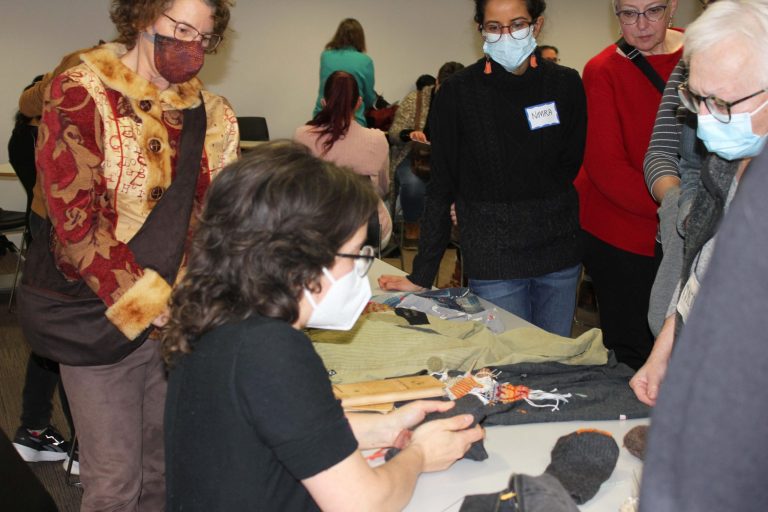The meeting room in Kitchener Public Library’s basement buzzes with excitement as people get up from their chairs and scatter, holding bingo cards and pencils in hand.
They pepper each other with questions.
“Do you prefer a rotary cutter or scissors? Did you learn to sew from a grandparent? Do you draft your own patterns?,” they ask.
This isn’t an ordinary bingo game. It’s sewing bingo: an icebreaker activity for members of the new KW Garment Sewists Guild to get to know each other at the guild’s second in-person meeting.
“The passion you can feel in the room is so intoxicating,” Steph Trotter, co-president of the region’s newest craft guild, said.
These enthusiastic garment makers hail from all over the region. Some of them follow each other on Instagram only met in person at the January guild meeting. The one thing they all have in common is Spool and Spindle, a beloved indie fabric shop in uptown Waterloo that closed its doors last summer.
It now only exists as a print shop, operated by a former employee of the fabric store.
The term “sewist” is a fairly new one in the sewing world, differentiating between those who sew clothing as a hobby, from seamstresses who sew for a living.
Trotter is also a former employee of Spool and Spindle. She knew many loyal customers were saddened to lose the store as a place that connected them to other like-minded sewists.
“That sadness, it pushed me to make this community,” Trotter said.
“I think I started the guild because there are too many people in town for us to just fade away. We needed something to bring us together.”
Last fall, she wrote a post on Instagram asking if the shop’s customers wanted to stay connected in some way to continue to share their passion for sewing. The response she received was overwhelming.
Everyone wanted in. They all wanted to reclaim a lost space, a place to revel in each other’s projects in person and belong in a community focused on sewing your own clothes.
“The store did create community. Working at Spool and Spindle during the pandemic, I got to know people’s names filling out orders, but I didn’t know them,” Trotter said.
Now she can get to know many of those people through the guild.
Trotter’s friend Jen Collins, also co-president of the group, offered to help her organize the guild and get it off the ground. The guild has an Instagram page and a Patreon page that members can join to stay connected virtually.
It didn’t take long for the guild to collect 200 followers on Instagram and 58 registered members on Patreon.
“We’re not here to teach you, we’re here to share and commiserate with you,” Collins said.
“Our biggest goal for the first year is building community and getting to know each other,” she said.
The group’s biggest long-term goal however is to create a barrier-free environment that is open to people of all ages, identities and skill levels. The guild allows anyone to join a meeting free of charge.
Some established creative guilds are often rigid and not queer-friendly or very inclusive of skill level, Trotter said.
“We really want to be more open. We want you to come as you are,” she said.
Trotter was surprised by the interest in the group. She wasn’t expecting so many people, and she wasn’t expecting such a wide diversity of sewing abilities.
Trotter immersed herself into sewing when she started working at Spool and Spindle. Being part of a community of like-minded people offered her a place to learn and grow her garment sewing skills.
Collins didn’t sew for many years until she pulled out her mother’s Kenmore sewing machine from the 1970s just before then the pandemic began. She made masks, stumbled across her first sewing patterns from indie pattern companies and ventured into the sewing world on Instagram.
“I found a diverse community. I found people who looked like me,” Collins said.
Soon she was making clothing that fit her better than anything she has purchased at a store.
Collins was proud of what she made for herself, as are all the other people who showed up to January’s guild meeting. That is why everyone’s favourite part of the meetings by far is “Sew and Tell.”
“People love it because they get to show off things they made their friends don’t care about,” Collins said.
January’s meeting also featured a presentation about mending your own clothes by Elysha Schuhbauer.
In addition to monthly guild meetings, the guild also hosts virtual sewing circles.
As it grows, the guild hopes to raise enough money through paid memberships to invite more guest speakers to monthly meetings. A sub-committee is also planning a gala event called Frocktails.
The guild’s biggest barrier is the lack of affordable space for community groups to meet regularly in Waterloo Region. As their in-person meetings can draw up to 50 people, a large space is necessary.
“I think that hurts community,” Trotter said.
“I hope the group grows and becomes more diverse than it is.”
“People bring so many different skills and experiences. A diversity of skill sets is important in creating a community,” she said.

